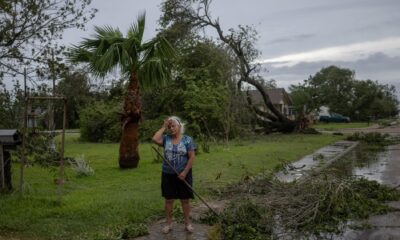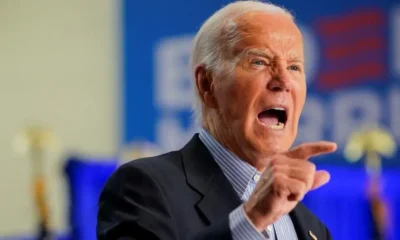The federal government says it will be extending two mobile health units it sent to Ontario in January as the province continues to grapple with “an alarming resurgence of COVID-19 cases.”
In a statement Saturday evening, Minister of Public Safety and Emergency Bill Blair said that the government was extending the two health units for another two months to at least June 30.
“The federal government is there to provide support where it is needed most, such as Ontario which has seen an alarming resurgence in COVID-19 cases,” read Blair’s statement.
Read more:
Ontario’s new COVID-19 restrictions have science ‘absolutely upside-down,’ experts say
Other pandemic concerns simmered to the surface in Ontario on Saturday, a day after Premier Doug Ford announced anti-pandemic powers that allow police to stop any motorist or pedestrian and ask where they live and why they’re not home.
The strict new measures drew furious criticism as the number of infected people in hospital reached record levels, prompting the provincial government to reconsider the clampdown.
The province amended the rules on Saturday evening, saying police will only be able to stop those who they have reason to believe are attending an organized public event or social gathering.
Ford, meanwhile, said rules ordering the closure of playgrounds would be amended to keep the facilities open. There was no word on the fate of golf courses and other outdoor recreational spaces, which were also shuttered in the latest round of public health measures.


“Ontario’s enhanced restrictions were always intended to stop large gatherings where spread can happen,” Ford said. “Our regulations will be amended to allow playgrounds, but gatherings outside will still be enforced.”
The government source, speaking on background, told The Canadian Press that the government was responding to widespread critiques about the new law enforcement powers.
Read more:
Ontario’s new COVID-19 restrictions include increased police powers, restricting gatherings
“We have heard a lot of feedback on this in the last 24 hours in terms of the scope and applicability,” said the source, who was not authorized to speak publicly. “We will be issuing a clarification to police chiefs and the public about the scope and scale of the order.”
Politicians and civil libertarians attacked the anti-pandemic restrictions earlier in the day, calling them misguided and describing the beefed-up police powers as overkill.
“I am very concerned about arbitrary stops of people by police at any time,” Toronto Mayor John Tory said in a Saturday tweet.
While violating restrictions can carry a $750 fine, failure to provide police with requested information can result in criminal charges, according to the province’s association of police chiefs.
Big and small police forces across the province said they had no intention of exercising their new-found powers. Civil rights groups, however, took little comfort in such statements.
“Ontario is one step closer to becoming a police state,” said Joanna Baron, executive director of the Calgary-based Canadian Constitution Foundation.
“Low income and minority communities have borne the brunt of this pandemic in terms of cases and mortality, and they are now more likely to bear the brunt of police enforcement.”
More than 2,000 patients were in Ontario hospitals due to the novel coronavirus on Saturday for the first time since the onset of the year-long pandemic. Of the 2,065 patients receiving treatment, the province said 726 were in intensive care and 501 were on a ventilator.
“In Ontario particularly, the mortality is going to rise from COVID-19 if health care gets overwhelmed,” said Dr. Zain Chagla, an infectious disease physician at St. Joseph’s hospital in Hamilton and an associate professor at McMaster University.
The variant-driven third wave also leaves young people more susceptible to infection and could prompt more postponed or cancelled hospital procedures, he said.
Ontario logged 4,362 new COVID-19 infections on Saturday, down from the single-day peak of 4,812 recorded a day earlier.


Quebec also reported its highest number of hospitalizations and intensive care cases due to COVID-19 since the second wave.
The province recorded 692 hospitalizations — 175 of them in ICUs — over the previous 24 hours, health officials said Saturday.
The figures mark the highest number of hospitalizations since Feb. 19 and the highest number of ICU cases since Feb. 3.
Quebec’s case count climbed by 1,537 on Saturday.
Elsewhere, officials in Nunavut reported six new cases of COVID-19, all in the capital city of Iqaluit.
New Brunswick reported 11 new infections, while Nova Scotia logged eight.
Manitoba reported 183 new COVID-19 cases, Saskatchewan notched 249, and Alberta recorded 1,486.
— With files from Global News
Must See
-




Entertainment
/ 3 days agoFaveSzn’s Revelation: Dating Choirmaster at 10 and Sexual Curiosity
Nigerian singer, Chidozie Ugochinyere, popularly known as FaveSzn, has revealed that she once dated...
By Flying Eze -






Europe
/ 3 days agoWhy Hungarian Prime Minister Orban visited
Two months later, the leaders of China and Hungary met again. Hungarian Prime Minister...
By Flying Eze -






News
/ 3 days agoThree dead and millions without power as Tropical Storm Beryl hits Texas
Man, 53, and woman, 74, killed by fallen trees and third person drowns amid...
By Flying Eze



